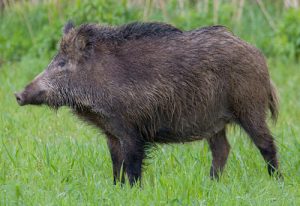ProMed reports 90 persons presented to the Infectious Diseases Hospital Amedeo di Savoia, Torino, North-West Italy between 24 Dec 2019 and 10 Jan 2020 after consuming raw sausages from a wild boar hunted in the area of Susa Valley, 50 km [31.1 mi] away from Torino, in late November 2019.
 All of them either were symptomatic (fever, muscle and/or abdominal pain, nausea) or had peripheral blood eosinophilia over 500/cmm, or both. IgG serology for trichinella was performed by immunoblot (Trichinella E/S IgG kit, EFFEGIEMME, Milan, Italy) and resulted positive in 48/90 (53.3%), allowing a diagnosis of confirmed trichinella infection.
All of them either were symptomatic (fever, muscle and/or abdominal pain, nausea) or had peripheral blood eosinophilia over 500/cmm, or both. IgG serology for trichinella was performed by immunoblot (Trichinella E/S IgG kit, EFFEGIEMME, Milan, Italy) and resulted positive in 48/90 (53.3%), allowing a diagnosis of confirmed trichinella infection.
Otherwise, a diagnosis of suspected trichinella infection was made with a negative serology, probably due to performing the test too early, before the development of antibodies or possibly a false negative result. In a few cases (under 10 cases) an alternative diagnosis was considered.
All patients were treated with oral albendazole 400 mg twice daily for 10 days and prednisone 50 mg/day.
Most likely, all patients were infected after eating meat from a single animal, given the low prevalence of the infection in this area: no human case has ever been detected in Torino province, and only one wild boar has been found positive for trichinella at microscopy in Susa valley in the last 10 years.

.jpg) alarming regularity.
alarming regularity.